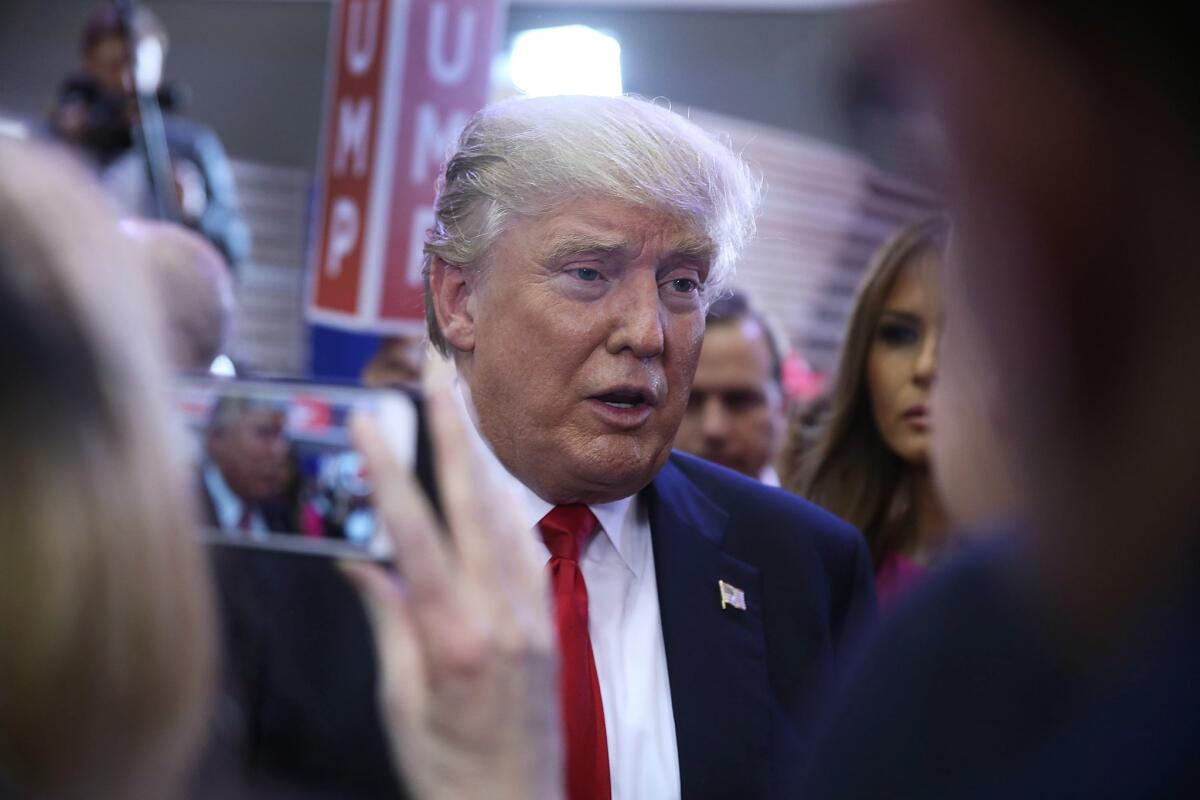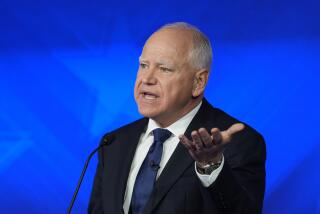Chinese watch Trump’s rise as many Americans do: with bemusement and dread

Donald Trump speaks to reporters in the spin room after a March 10 GOP presidential debate in Coral Gables, Fla.
- Share via
reporting from BEIJING — Donald Trump called the 1989 Tiananmen Square protest a “riot” in a Republican presidential debate on Thursday night, responding to a question about a 1990 interview in which he said that the government’s massacre of protesters “shows you the power of strength.”
China’s Communist party leadership deployed the military to open fire on the massive, peaceful demonstration, killing hundreds, maybe thousands of people. Authorities strictly limit public discussion about the protest, which they have condemned as a “counter-revolutionary riot.”
In the 1990 interview with Playboy magazine, Trump said: “The Chinese government almost blew it. Then they were vicious, they were horrible, but they put it down with strength. That shows you the power of strength. Our country is right now perceived as weak.”
On Thursday, he said that he never intended to voice support for the massacre. “That doesn’t mean I was endorsing that,” he said. “I said that was a strong, powerful government. They kept down the riot, it was a horrible thing.”
Although Chinese social networks barely registered the comment — mentions of the protest remain censored on the Chinese Web — many Chinese have been watching Trump’s rise as many Americans are, with a mix of bemusement and dread.
“His ideas are very strange — I don’t know why Americans support him,” said Zhang Ming, a 35 year-old business consultant in Beijing. “I know the other Republicans are trying to stop him — any American with a brain is trying to stop him.
“The U.S. is still a role model for democracy. It has its problems though, and Trump is a reflection of its problems.” Zhang said that she has never been to the U.S., and has been following election news online.
Trump has repeatedly lashed out at China, especially its currency policy and trade practices, as a perceived source of America’s economic woes.
Yet Chinese Internet users have focused more on his behavior than his positions. Some have bestowed him with unflattering nicknames such as “lunatic,” “big mouth” and “mattress” — the Chinese word, chuanpu, sounds like Trump.
News in early February that Trump had been nominated for a Nobel Peace Prize sparked off fierce criticism in China — not only of Trump, but of the prize itself. (An unidentified U.S. nominator tipped him for his “vigorous peace through strength ideology”).
On Feb. 4, an article in the state-run Global Times newspaper headlined “Big Mouth Trump is nominated for a Nobel prize for his anti-Chinese statements,” racked up more than 3,200 comments. Many remarked that Trump perfectly embodies U.S. foreign policy. One called him a “violent, impetuous imperialist.”
Some observers, both online and in interviews, said that they hoped Trump would be be elected, if only because his presidency would accelerate America’s decline. “He’s very interesting,” said Zhang Xinyan, 40, a free-lancer. “I hope he gets elected, just to see what happens.”
Others have voiced support for Trump as an alternative to Hillary Clinton, whom many perceive as tough on China.
“If global geopolitics is a Peking Opera, Hillary is an exquisite master, and Trump is an awkward walk-on,” a Tuesday article in the Global Times quoted an unnamed Chinese Internet user as saying. “Obviously the latter is more likely to make mistakes, to be passive, and to be easy to cope with.
“Trump is a ‘just and honorable’ boor, and Hillary is a calculating hypocrite,” it continued. “If Trump is elected, the decline of the American economy will accelerate; if Hillary is elected, the decline will be delayed.”
Chuan Xu in the Times’ Beijing bureau contributed to this report.
More to Read
Sign up for Essential California
The most important California stories and recommendations in your inbox every morning.
You may occasionally receive promotional content from the Los Angeles Times.













